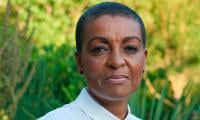Families from Iraq’s Fallujah flee one hell to find another
HABBANIYAH, Iraq: They fled starvation and Jihadist tyranny in Fallujah for the safety of displacement camps but thousands of Iraqi families still have nothing to eat and nowhere to sleep.
"The government told us to leave our homes, so we did. The way they described it, we were going to find heaven," said Ayyub Yusef, a 32-year-old from Fallujah. "I don’t regret leaving because we would have died there. Here, we are alive, just about, but it’s really just another kind of hell," he said.
Yusef, his wife and two children are among the tens of thousands of Fallujah residents who have fled the government’s operation against the Islamic State (IS) group in the city.
More than 60,000 people have been forced from their homes in the area over the past month and a sudden influx of civilians pouring out of the city centre last week has left the aid community unable to cope.
Yusef’s family was rejected from several camps that were already full and washed up on the shores of Lake Habbaniyah, where yet another camp was being erected. He had not been given a tent yet and had been left to sleep outside with his family for four nights.
"My parents finally got a tent in another camp, so we will try to reach them to sleep with them tonight," he said.
As the blistering sun set on the lake, once a coveted holiday spot in Iraq, men swarmed round a truck to collect tent poles and tarpaulins.
"We were expecting some kind of accommodation at least but we were given nothing. Now we have to erect our own tents," said 49-year-old Taresh Farhan, banging on the canvas and poles with his fist to straighten them out. One young woman was furious.
"We had to live through the tyranny of Daesh (IS) and now it’s just another injustice," she said, declining to give her name.
"Five days here and nothing to eat, not even a bottle of water... This camp is just like the rest of Iraq, if you don’t have connections, you will get nothing," she said.
"Shame on them, there is no bathroom for the women... We have to go in the desert," said the woman, her eyes blazing with rage through the slit of her niqab face veil.
At another, rapidly expanding camp in Khaldiyeh further along the shores of Lake Habbaniyah, an NGO called Preemptive Love Coalition delivered basic foods.
For many of the recently displaced Fallujah residents there, it was the first distribution they had seen.
They queued patiently as gusts of warm wind cloaked the camp in orange dust.
"The last days in Fallujah, we were cutting grass in the street to eat it," said Hamde Bedi, a 41-year-old woman pregnant with her eighth child. Her family had been displaced several times over since the launch of the government’s offensive to retake the IS bastion a month ago.
The UN’s refugee agency said on Tuesday that 20 more camps would be needed for the Fallujah displaced in the coming weeks and added it was "urgently seeking $17.5 million" to meet their most immediate needs.
Prime Minister Haider al-Abadi declared victory last week after the national flag was raised above the main government compound. Security forces continue to battle Jihadists in northern neighbourhoods of the city but the biggest crisis the government faces now is humanitarian.
"What we’re seeing is the consequence of a delayed and heavily underfunded response with an extreme toll on the civilians fleeing from one nightmare and living through another one," the Iraq chief of the Norwegian Refugee Council, Nasr Muflahi, said on Tuesday.
-
 'Bridgerton' Star Adjoa Andoh Weighs In On Character's New Aspirations
'Bridgerton' Star Adjoa Andoh Weighs In On Character's New Aspirations -
 Scientist Discovers New ‘bat Virus’ Infecting Humans; But That's Not 'Nipah'
Scientist Discovers New ‘bat Virus’ Infecting Humans; But That's Not 'Nipah' -
 Laura Dern Heaps Praise For Close Friend Sheryl Crow
Laura Dern Heaps Praise For Close Friend Sheryl Crow -
 Paul Rudd Recalls Innocent Move Almost Lost Him Movie Role
Paul Rudd Recalls Innocent Move Almost Lost Him Movie Role -
 Here's Why Hugh Jackman, Sutton Foster Are House Hunting In Australia
Here's Why Hugh Jackman, Sutton Foster Are House Hunting In Australia -
 Gabrielle Union Reflects On Her Friendship With 'Bring It On' Co-star Kirsten Dunst
Gabrielle Union Reflects On Her Friendship With 'Bring It On' Co-star Kirsten Dunst -
 Rose Byrne Opens Up About Struggles After Becoming A Mother
Rose Byrne Opens Up About Struggles After Becoming A Mother -
 Prince William, Kate Middleton See Media Rivalry With Meghan As 'exhausting'
Prince William, Kate Middleton See Media Rivalry With Meghan As 'exhausting' -
 Tom Cruise Feels 'unsafe' After Robbery Near Home
Tom Cruise Feels 'unsafe' After Robbery Near Home -
 Epstein Leaves $50m, Private Island And Properties For Girlfriend In Final Will
Epstein Leaves $50m, Private Island And Properties For Girlfriend In Final Will -
 Daveed Diggs Reflects On Main Theme Of Latest Gig 'In The Blink Of An Eye'
Daveed Diggs Reflects On Main Theme Of Latest Gig 'In The Blink Of An Eye' -
 Kylie Kelce Determined To 'lead By Example' For THIS
Kylie Kelce Determined To 'lead By Example' For THIS -
 Al Roker Opens Up About Leaving A Legacy Behind Following His Exit From 'Today'
Al Roker Opens Up About Leaving A Legacy Behind Following His Exit From 'Today' -
 Kate McKinnon Gushes About Andrew Stanton Directed Movies
Kate McKinnon Gushes About Andrew Stanton Directed Movies -
 Kate Middleton Plans To Privately Extend An Olive Branch To Meghan Markle: 'Last Resort'
Kate Middleton Plans To Privately Extend An Olive Branch To Meghan Markle: 'Last Resort' -
 Gold, Silver Prices Fallen Sharply; What’s Driving The Drop?
Gold, Silver Prices Fallen Sharply; What’s Driving The Drop?



